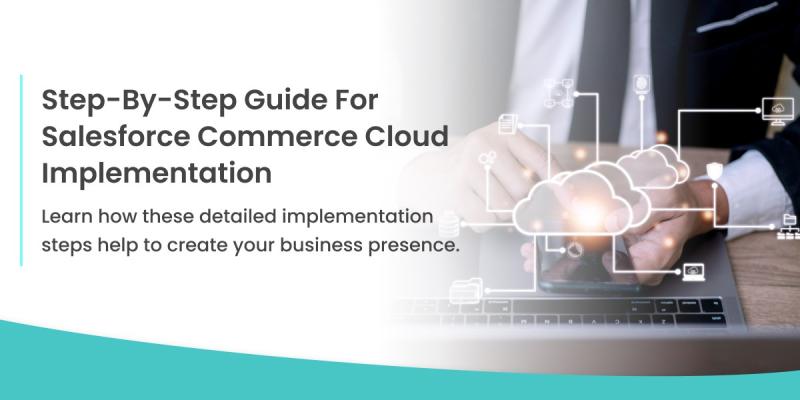A Guide to Implement Salesforce Commerce Cloud

Every business is different and has unique demands. Competition is rising across the globe when it comes to businesses nowadays. E-commerce businesses have expanded, and people there have begun using Salesforce Commerce Cloud to manage their platforms and create better shopping experiences across various channels.
If executed properly, its advanced features, such as artificial intelligence integration, extensive customization options, and support for multiple payment methods, make it an ideal choice for firms to enhance their business presence online.
Let’s examine the blog and understand the key steps for a successful Salesforce Commerce Cloud Implementation.
Step for a Successful Commerce Cloud Implementation For E-Commerce Business
Define Business Objectives
Before moving into the Commerce Cloud implementation process, it is essential to identify your business aim. Analyze the business goals you wish to achieve with the Salesforce Commerce Cloud, such as increasing sales, improving customer experience, or expanding into markets. By defining the objective, it is possible to create a roadmap for the implementation process and measure success properly.
Connect with Clients Quickly
By connecting with stakeholders early from various business departments like IT, marketing, customer service, and finance, firms can carry out their insights and expertise in reshaping the implementation strategy. Communicating with clients daily makes sure that every team member is aligned with business goals and aware of their roles and responsibilities throughout the implementation process.
Adopting the Right Implementation Partner
The major step is to choose the professional partner that directly impacts the success of the business. Opting for a Salesforce Commerce Cloud implementation partner with years of expertise in providing e-commerce solutions helps you to make your presence in the industry with their ongoing post-implementation support.
Detailed Project Plan
It is a must for users to have a well-planned project plan that covers the outline, milestones, and deliverables. It should define the roles and responsibilities of team members with advanced project management tools to track the progress and ensure accountability with the implementation process.
Customized as per Users
By utilizing the advanced Commerce Cloud customization features, you can create a great user experience customized as per the target audience. It also helps to customize product listings, site navigation, and checkout processes to showcase the brand identity and meet customer expectations. By leveraging AI features, firms can get personalized recommendations and enhance the consumer experience.
Existing System Integration
The instant integration with existing systems, including customer relationship management (CRM), enterprise resource planning (ERP), and payment gateways, is important for maintaining business efficiency. It is important to ensure that your implementation partner has API integration to facilitate data flow across platforms. It will enable real-time inventory management, order processing, and data synchronization.
Test & Train Properly
Before proceeding further, it is important to conduct testing of Salesforce Commerce Cloud Implementation. It includes testing all features, functionalities, payment processes, and user journeys. By identifying and analyzing issues during the testing process, make sure to proceed with a smooth launch.
Training is another important aspect for those firms that have opted for Salesforce Commerce Cloud. By providing training sessions that cover platform functionalities, management tools, and best practices, teams can make sure to have the necessary skills that enable the platform’s features to understand business potential.
Conclusion
Salesforce Commerce Cloud implementation works as a best investment that automatically increases the business ROI if executed correctly. Initiating by defining clear objectives, connecting with stakeholders, and following a roadmap, firms can leverage Salesforce Commerce Cloud to enhance e-commerce capabilities and drive growth.
With continuous optimization and a focus on user experience, firms make sure to remain competitive in the marketplace.
Also Read: Top Salesforce Implementation Challenges: How to Resolve?
Post Your Ad Here

Comments